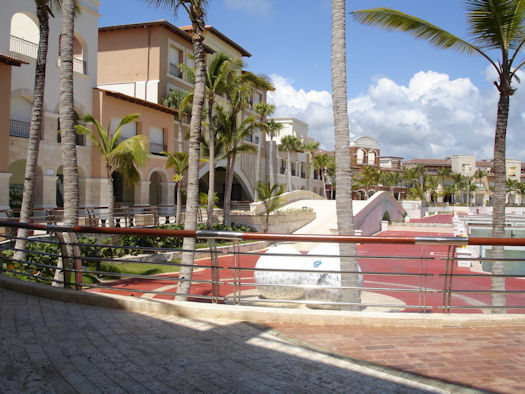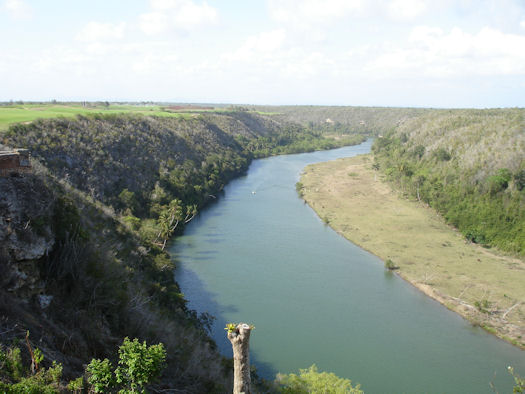Dominican Republic
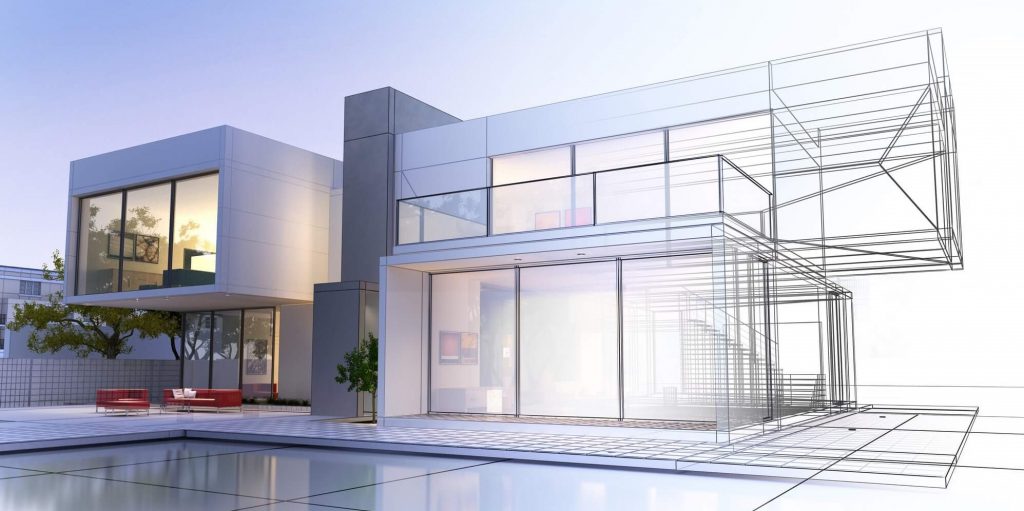
Q. Where is the Dominican Republic?
A. Located between Cuba and Puerto Rico, the Dominican Republic occupies the eastern two-thirds of the island of Hispaniola bordering Haiti in the Caribbean Sea. To the north lies the Atlantic Ocean, and to the south rests the Caribbean Sea.
With premier ownership opportunities at exceptionally affordable prices now available in the Caribbean, prospective home buyers will find the Dominican Republic to be distinctively charming while offering all the modern conveniences one would want in a vacation home.
Q. What is there to do in the Dominican Republic?
A. Famous for its beaches, the North Coast area of the Dominican Republic is one of the best places in the world for windsurfing and kiteboarding.
With breathtaking views of the landscape, the Dominican Republic would be the 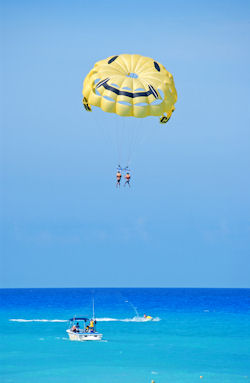 richest country in the Caribbean if its wealth could be measured by its landscape. The Dominican Republic is a dynamic place with its high mountains, fertile valleys and diverse ecosystems
richest country in the Caribbean if its wealth could be measured by its landscape. The Dominican Republic is a dynamic place with its high mountains, fertile valleys and diverse ecosystems
The Dominican Republic is home to some of the largest and most diverse parks in all the Caribbean. Over 10% of the country has been set aside for national parks and scientific reserves.
Outdoor activities are abundantly available in this nation offering golfing, hiking, mountain biking, river rafting, surfing, whale watching, wind sports, diving and snorkeling. Hiking, caving, and biking tours are likewise available through the mountains and countryside of the Dominican Republic.
There is also great whale watching off the Peninsula de Samana.
There are free-port zones for shopping at Santo Domingo’s Las Americas International Airport and at Puerto Plata International Airport.
Q. What are some major points of interest in the Dominican Republic?
A. Points of interest include:
• Cabarete: Located on the North Coast of the Dominican Republic, this area has near ideal conditions for windsurfing and kiteboarding and is an internationally renowned destination for the enthusiasts of these sports.
• La Romana: This is the third-largest city in the Dominican Republic and it is situated on the southeast coast. The nearby 7,000 acre resort of Casa de Campo offers recreational activities such as tennis, polo, horseback riding, and golf.
• Puerto Plata: Nicknamed the “Amber Coast” for its rich deposits of clear amber, this is the largest city on the North Coast of the Dominican Republic. This beautiful coast boasts many pristine beaches known by the names of Sosua, Grande, Dorada, and Cofresi beaches.
• Santiago: The second largest city in the Dominican Republic and its industrial center, Santiago is the home of world-famous meringue music, robust Dominican coffee, fine cigars, Bermudez rum, and exemplary dining.
• Santa Domingo: As the capital of the Dominican Republic, major universities, sports stadiums, and extensive redevelopment efforts throughout the western section of the city are the norm. At one time the prize jewel of the Spanish colonies, Santa Domingo is now on track to reclaim its former glory.
Q. What is the Dominican’s government attitude toward foreign investment?
A. The Dominican government officially welcomes international investors. A foreign investment law enacted in December 1995 allows unlimited foreign investment in nearly all sectors of the economy.
In 1997 the government established the Office for Investment Promotion (OPI) which is proving to be an important contact for potential investors.
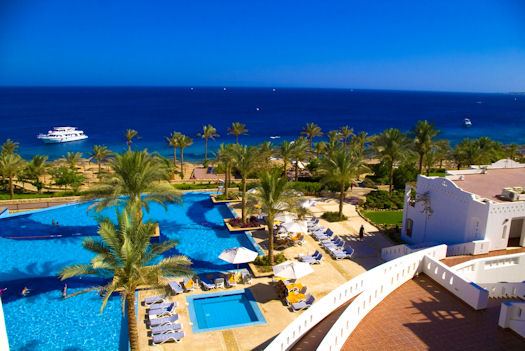
Q. How are real estate transactions governed in the Dominican Republic?
A. Real estate transactions are presently governed by the Land Registry Law of amendments. A new Land Registry Law was enacted in 2005.
Q. Are there any restrictions against foreigners owning real estate in the Dominican Republic?
A. There are no restrictions on foreigners purchasing real property in the Dominican Republic. In early 1998, laws were established stating that the only requirement for ownership is that the Title Registry Offices keep a record, for statistical purposes, of all purchases made by foreigners.
Foreigners are allowed to purchase property in the Dominican Republic with the same rights and obligations as a Dominican citizen.
Q. Is it relatively simple to acquire property in the Dominican Republic?
A. Acquiring property here in the Dominican Republic is a straightforward transaction. However, foreigners purchasing property outside of their native countries are urged to exercise caution.
The realtor and notario working with you throughout the process should be able to assist you. Hiring your own attorney is something you may wish to consider. It is common for realtors to recommend attorneys whom they know and trust.
You are ultimately responsible for due diligence with your attorney to ensure that all documentation ranging from title searches to surveys to furniture inventories (if applicable) has been properly verified and processed.

Q. How do real estate purchases work in the Dominican Republic?
A. Instead of the traditional offer and counter-offer process found here in the United States, you would first negotiate with the seller on the selling price. Once a verbal agreement has been reached, then the process of purchasing property will begin.
A binding “Promise of Sale” or “Option to Purchase” is drawn up and prepared by an attorney and signed by both parties. It is at this time that a deposit or advance payment is made.
Q. What is the best way to protect myself when purchasing property in the Dominican Republic?
A. Your best protection is to get a trustworthy and reliable attorney, and title insurance. This ensures that you are adequately protected in the “Promise of Sale” and that you have legal recourse should the need ever arise.
The government of the Dominican Republic provides insurance but is not known for its solvency, so a private insurer is strongly recommended. Your realtor can likely recommend one.
Q. What are the steps to homeownership in the Dominican Republic?
A. There are four simple steps to homeownership in the Dominican Republic. These steps are as follows:
• The buyer and seller sign a “Contract of Sale” in the presence of a notario who then authenticates this contract. The contract contains the legal description of the property, the price, and conditions of sale.
• The contract is then sent to the nearest Internal Revenue Office for payment of the appropriate taxes.
• This contract and the “Certificate of Title” of the seller are then deposited at the Title Registry Office in the jurisdiction in which the property is located thereby recording the sale.
• The Title Registry Office will then issue a new Certificate of Title in the purchaser’s name and cancel the old Certificate of Title previously issued to the seller.
The entire process from the Contract of Sale to the issuance of the new Certificate of Title will vary from a few days up to a few months depending on the office at which the sale is recorded.
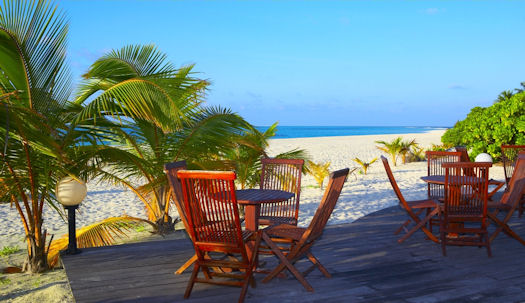
Q. What are my closing costs and tax liabilities?
A. You should expect to pay approximately 5% of the total sale price for taxes and closing costs. This expense includes a transfer tax of 4.48%, document taxes, special stamps for registration, and tips.
Taxes must be paid before recording the purchase at the Title Registry Office. Property taxes in the Dominican Republic are extraordinarily low, and annual taxes will be negligible for most homeowners unless you purchase an extremely expensive property. If you are unsure as to what comprises your tax liabilities, consult with your attorney for advice.
Q. Should I have the property surveyed?
A. Verification that the property being sold is the same as the one shown on the survey provided by the seller should be assessed by an independent surveyor.
Even when the seller provides a government-approved plat, the survey should be checked for compliance. Exceptions are made if the property in question is located in a previously inspected subdivision.
Q. When improvements have been made to the property, should I have it inspected?
A. It is recommended that you arrange for an inspection of any and all improvements by a qualified builder or architect to confirm that the plans presented are correct and that the improvements are in good condition.
Q. Do I need a permit to purchase land in the Dominican Republic?
A. Before purchasing raw land in the Dominican Republic, it is highly recommended that you have your attorney confirm that the property may be used for the purposes you desire.
Restrictions may be applicable in specified zones. An example of such a restriction currently exists along the entire Dominican coastline known as the “maritime zone” in which all beaches are designated as public property.
Building is prohibited within the maritime zone without a special permit. Also tourist zones have specific building restrictions.
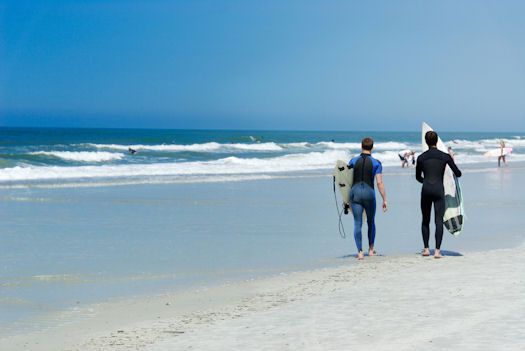
Q. What do I need to do to ensure possession of purchased property?
A. Your attorney should ensure that the seller is in possession of the property in question and that no squatter’s rights exist.
The rights of tenants on the property are strongly protected under Dominican law, and evicting someone who is unwilling to leave can be a time-consuming and expensive process.
Q. What is the economy like in the Dominican Republic?
A. There was economic stagnation in the Dominican Republic in the 1980s. However, the economy has had steady growth in the 1990s. The recovery has been led by policy measures implemented by the government and the Dominican Central Bank. These include an economic modernization program, stricter fiscal 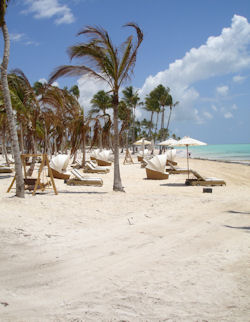
During the late 1990s, the principal growth sectors of the economy were communications, construction, hotels, electricity and water, agriculture and cattle and commerce.
Today, the Dominican Republic is in a growth cycle accompanied by relatively low rates of inflation.
The Dominican Republic imports goods from all over the world, but approximately 43% of the country’s imports come from the United States.
Dominican authorities are concerned with modernizing the legal system under which foreign and national businesses operate in the Dominican Republic, as well as with reforming certain important sectors of the economy to open them to foreign investors.
Q. What is the population of the Dominican Republic?
A. There are nearly 10-million people living in the Dominican Republic.
Beyond the nation’s capital, Santo Domingo, much of the Dominican Republic is distinctly rural, and a large percentage of Dominicans subsist on agriculture (or by fishing along the coast).
Q. How big is the Dominican Republic?
A. As the second largest country (after Cuba) in the Caribbean, the Dominican Republic has about 1,000 miles of shoreline, four mountain ranges, and numerous lush valleys.
In total, the country is roughly 18,712 square miles, making it just more than twice the size of New Hampshire.
Q. What is the climate like?
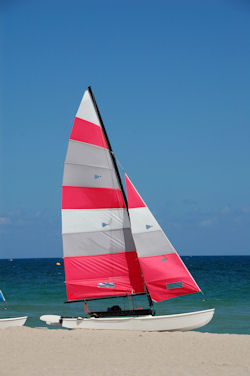 A. The country has a tropical climate, with an average temperature of 77 degrees.
A. The country has a tropical climate, with an average temperature of 77 degrees.
Q. What language is spoken in Dominican Republic?
A. Spanish is predominantly spoken. The Dominican Republic is a Hispanic country, therefore, its culture and people is derived mainly from Spain (language and religion), though blended with African traditions (musical expressions and the carnival vibe of life).
Q. What is the “national pasttime?”
A. Baseball.
Q. What is the main religion?
A. Roman Catholic (85%).
Q. Briefly, what is the country’s history?
A. The island was discovered by Christopher Columbus more than 500 years ago. The island quickly became an important base from which Spain expanded its empire into the rest of the Western Hemisphere.
At times the island has been dominated by France, Haiti and the United States. The Dominican Republic achieved it independence from Haiti in 1844.
Oddly enough, the legal system is based on French civil codes (Napoleonic Codes), which were first introduced to the island by the French and adopted formally in 1884 as part of the nation’s legal system.
The Dominican Republic also has been influenced by other legal systems. The Land Registration Law, for instance, is based on legislation enacted in 1920 when United States military forces were in the country.
Note: Unlike the United States, there are no juries in the Dominican Republic; therefore, judges render all verdicts.
Note: You are allowed to vote when you are age 18; it is universal and compulsory. Married persons can vote regardless of age. Members of the armed forces and police cannot vote.
Q. What is the current state of government in the Dominican Republic?
A. For the past 30 years, the country has been a stable democracy with universal suffrage, separation of powers and a constitution that bears a remarkable resemblance to the constitution of the United States. The power of the government is divided among three independent branches: the executive, the legislative and the judicial.
Q. What is the currency in the Dominican Republic?
A. The Dominican Peso (RD$) is the national currency of the country although the U.S. dollar is accepted in many places, especially tourist-oriented shops and hotels. The exchange rate between the two currencies fluctuates on a daily basis.
Q. What is required of foreigners to enter into the Dominican Republic?
A. All foreign visitors must have a valid passport.
Q. Which airlines fly to the Dominican Republic?
A. American Airlines and Continental are among carriers offering regular flights from New York, Newark, and Miami to Puerto Plata’s Gregorio Luuperon International Airport and Santo Domingo’s Las Americas International Airport.
A new international airport opened in Samana in early 2008.
Q. What is the tourism situation in the Dominican Republic?
A. The Dominican Republic is now the major tourist island in the Caribbean. It attracts about 13% of the region’s tourist flow. Tourism has become one of the most important aspects of the Dominican economy.
Tourism has been given a tremendous boost by the fact that the Dominican Republic has the largest tourist accommodation capacity in the Caribbean.
With the lowest registered rate of tourist expenditure per day in the region, the Dominican Republic is one of the most affordable places for all-inclusive vacationing for visitors.
However, agriculture is still the backbone of the economy. Traditional exports – sugar, cocoa, coffee, bananas and tobacco – flourish in this land of fertile valleys and foliage-clad mountains.
Q. How do I obtain a Dominican Republic passport?
A. This is an easy matter to deal with. First, you are to obtain a provisional residency visa at the Dominican consulate closest to you. Second, you are to receive your permanent resident card at the General Immigration Office in Santo Domingo.
If you purchase property in the Dominican Republic, your residency visa will then be expedited.
In order to hasten this process, the Office for Foreign Investment Promotion has established a special program for foreign buyers making investments of more than 200,000 Dominican Republic pesos.
This ultimately means you will need to invest less than $6,000 to expedite your visa request.





